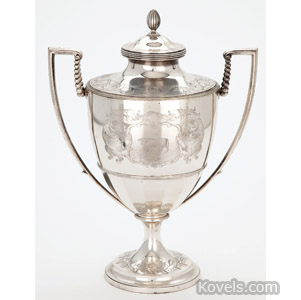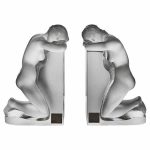Dear Lee,
Malcolm Forbes was not only a brilliant businessman but also a very serious collector. He had a house in Tangier, Morocco, filled with lead soldiers; an apartment in London with Victorian furniture and oil paintings; a collection of toy boats, a childhood favorite; a museum near his New York office with collections of toys, Fabergé eggs, jewelry and unusual precious objects; and least valuable but most unusual—a slew of trophies originally awarded to others.
When the Discovery Channel was planning to introduce Ralph and my TV series in the late 1980s, Malcolm Forbes offered to host the press party at his museum. He shook hands with each guest—most were writers interested in collecting—and discussed his collections. We were fascinated by his trophy collection because we owned a few and thought we were the only collectors eccentric enough to buy them. Our prize trophy is a “Bang & Go Back” yacht-racing award.
Forbes owned many huge silver yachting trophies and an enormous (almost 5-foot-tall) bronze trophy for what I think was a winning Japanese rowing team. We asked how he managed to buy when he was so well-known; others would think his interest showed a trophy had great value. He told us his secretary checked auction catalogs and marked things he might want. But he, a hands-on collector, usually placed his own bids.
Why trophies? He explained that each trophy marked the highlight of someone’s life, a winning moment that brought satisfaction and fame. Yet after the winner’s death, the family was discarding the trophy. Trophies can often be found at house sales and flea markets, reminders that fame is fleeting.
Some of Forbes’s trophies were sold in June by Heritage Auctions. So other collectors now own the shiny memorabilia honoring someone for “plashing [weaving branches] the greatest length of fence” (1798), winning the Stag Hounds Puppy Cup (1904), growing Brussels sprouts (1815) or swedes (rutabagas) (1898), third prize in a pretty baby contest (1917), a tent-pegging tournament (1886), a cricket-ball-throwing competition (1879), a draughts [checkers] competition (1949), a croquet game (1904), a hurdles race (1887) and a YMCA table tennis tournament (undated). One of the auctioned trophies is pictured. It honors the governor of an English “House of Industry” (a workhouse).
Forbes had the instincts and mind-set of a collector. Nothing is too insignificant to be collected, and every collection is interesting if the owner understands the history. Maybe your grandchildren will be important collectors of wrappers for “green” products or remarkable sports shoes or smart-phone apps. So follow the Forbes lead. Encourage collecting. It’s educational, satisfying and usually profitable.





Leave a Reply
You must be logged in to post a comment.